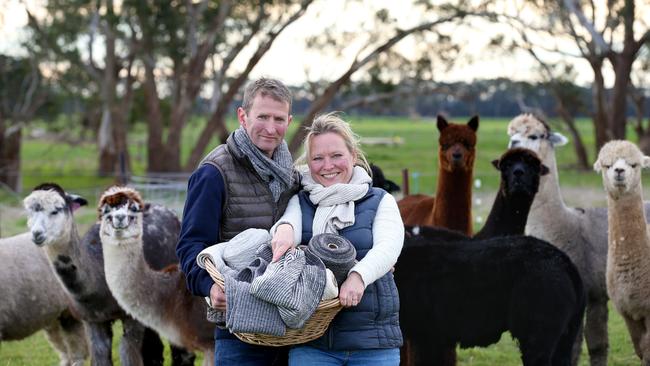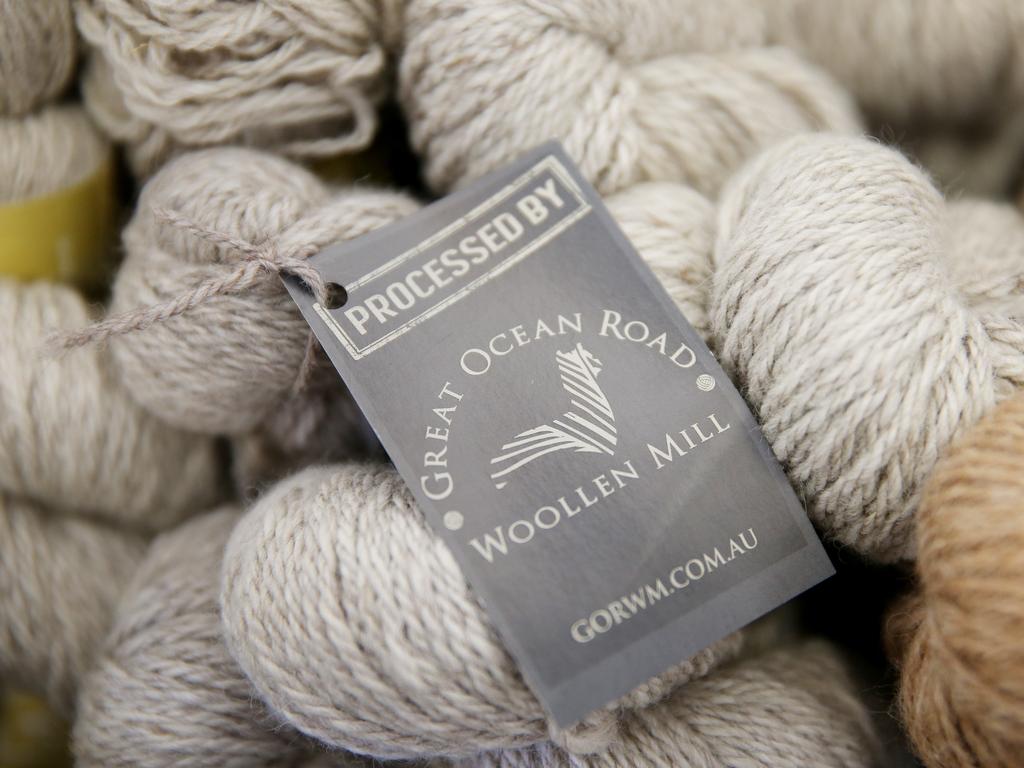Isabel and Nick Renters are selling alpaca knitwear and yarn in an operation that puts a high value on ethical production.
DES may have lost a few teeth and be fed a special “geriatric” diet of soaked, crushed lupins.
But at the age of 15, the alpaca still makes a damn fine fleece, according to his owners Nick and Isabel Renters, at the Great Ocean Road Woollen Mill.
“Des is one of my favourites, and yes, you can buy a yarn with his name on it in our shop,” Nick says.
“Whether it’s Des’ fleece or any of the other yarn we sell, we believe it’s the greenest on the market in Australia, because we use solar power, low-phosphate detergents, with the greywater used on our vegie patch.
“Our yarn has the lowest carbon footprint, not travelling more than 250km before it leaves the shop.”
Des’ fleece, and the yarn of his 24 other stud buddies, just got a little better after the mill at Ecklin South, near Timboon — southwest Victoria’s only wool spinning mill — became the first spinning mill in Australia to be certified by Ethical Clothing Australia.
Nick says the accreditation not only underscores their low environmental footprint, but maps a company’s supply chain, ensuring it’s Australian made.
“Australia grows the best alpaca fibre and wool in the world and since we opened (in 2015) we’ve seen how much of that is not getting processed in Australia,” says the 47-year-old, adding they also carry the Australian-made logo.
“We’ve become passionate about trying to remind people of what we do here — when you buy our yarn it’s got a story with it, full traceability.
“Yes you can buy something from China that is cheaper but you’ve got no idea what has been done to it, what chemicals were used, where it has come from. Our yarn, you can still pick out the grass seeds.”

Nick grew up in Warrnambool and was working as a gardener when, in 2006, he volunteered in Thailand, building homes in remote villages devastated by the Boxing Day tsunami.
It was there he met German-born Isabel and a year later the couple married and moved to Warrnambool.
Keen to have a rural lifestyle, they bought 8ha in Ecklin South with no plan other than to grow vegetables for themselves — purchasing alpacas as lawnmowers.
“When we got them shorn we thought, ‘What do we do with the fibre?’,” Nick recalls.
Never a pair to shy away from a challenge, the couple worked with a business consultant and decided to establish a mill, initially thinking they would process alpaca fleece from small farms.
In 2015 they bought a Belfast Mini Mills mill from Canada (“that cost more than the farm is worth”), which included 13 separate machines: washer, picker, dehairer (to separate coarse from fine hair), carder, spinner, steamer and skein winder.
When their original business plan didn’t stack up (“for some reason people with alpacas would rather burn the fleece than process it”) they decided to process and market their own alpaca fleece.

From an initial flock of six alpacas, the Renters now have 25, aiming to get to a maximum 50 in the next three years.
Now, in addition to milling their own alpaca fleece, they buy in superfine Merino and Polwarth wool from the Western District, to create blends.
They also source cotton from Queensland and most recently have imported linen from Belgium, the only exception to their 250km carbon footprint radius.

Every aspect of production is done on site, except for wool scouring in Geelong. However, they opt not to have the wool carbonised, a process which involves acid and bleach: “We prefer to let the customers pick out the occasional grass seed”.
In their first year they processed 100kg of yarn, or about 1000 balls, but now they manufacture 700kg.
It takes Nick 10 hours to spin 1kg of yarn.
MORE
The yarn is in natural colours — alpacas come in about 20 different shades — although occasionally they use natural dyes. This year, for the first time, they are using a Geelong company to commercially dye batches.
In December last year the Renters imported a German-made, computerised knitting machine. In the next two years they aim to create a fashion line of jumpers, beanies and gloves under their label Zauber — which means “magic” in German. For now, though, Isabel is in charge of knitting a line of scarfs.
About 70 per cent of their products are sold in their on-farm shop — built next to the Great Ocean Road Woollen Mill — which is open three days a week from September to May, offering mill tours at 2pm on weekends.
The remainder of the wool is sold in yarn stores in Melbourne, Sydney, Germany and New Zealand, as well as online.
Nick says like the food industry, an increasing number of consumers care about traceability and “paddock to product” processes.
“There is a real thirst for Australian-made products that can show the whole journey,” he says.
“For us it is about transparency, keeping manufacturing in Australia and being proud to create something out of the fibre that grows around us.”


How a Mount Bolton farmer lives without waste
A Mount Bolton woman who is committed to living with less impact is spruiking the philosophy of the four F’s: farming, foraging, fossicking and frugavoring.
Madonna & John Williamson share what title?
The Chase Australia’s Brydon Coverdale new quiz for The Weekly Times readers is here. Are you game to put your knowledge to the test?